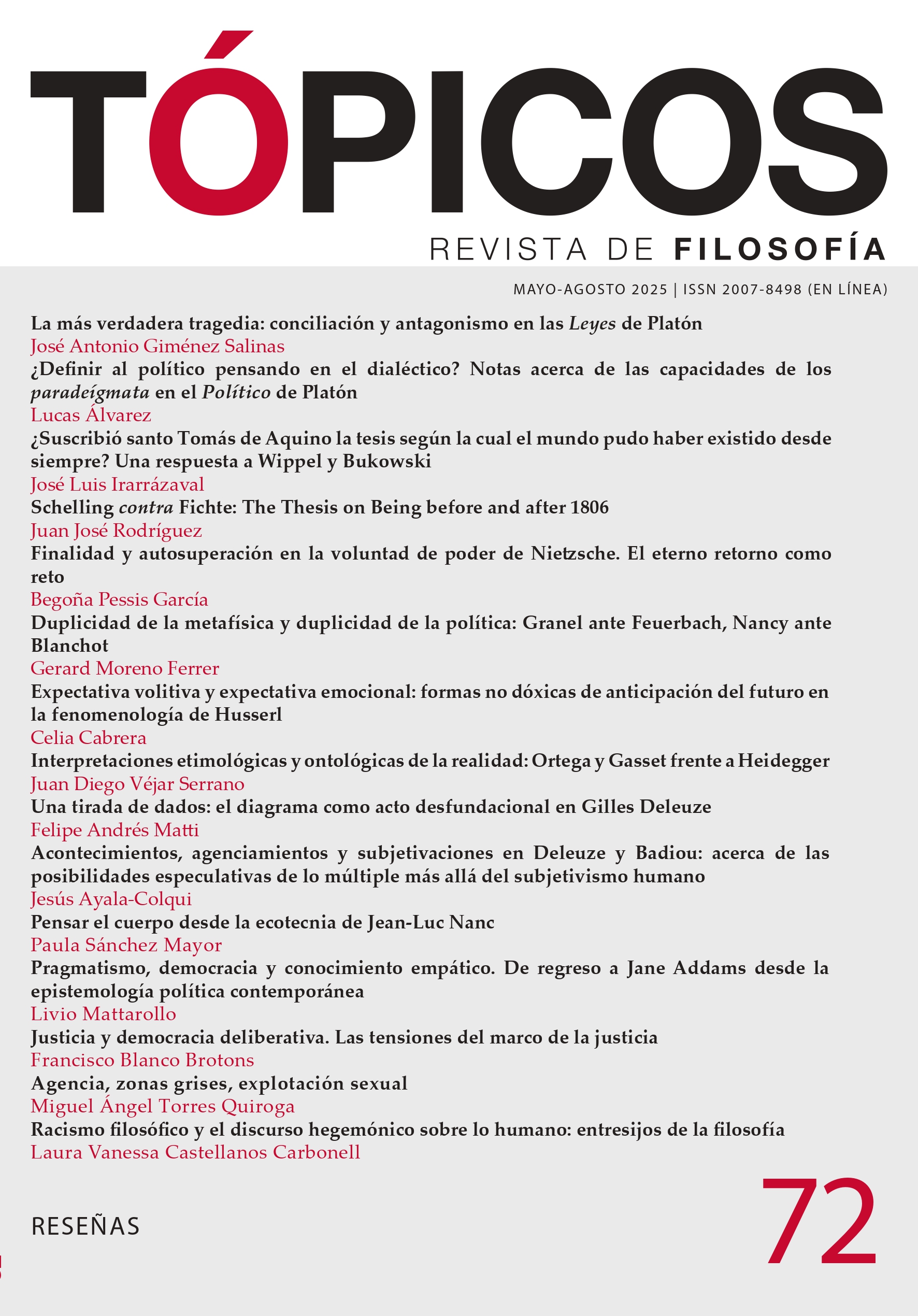Publicado 2025-04-29
Palabras clave
- democracia deliberativa,
- dominación,
- justicia,
- marco de la justicia,
- demos
Derechos de autor 2025 Tópicos, Revista de Filosofía

Esta obra está bajo una licencia internacional Creative Commons Atribución-NoComercial-SinDerivadas 4.0.
Cómo citar
Resumen
La cuestión del marco de la justicia —cómo delimitar las personas relacionadas por obligaciones de justicia— es crucial. Aquí se analizan las respuestas ofrecidas por varios autores, principalmente Benhabib, Forst, Fraser y Young, que, desde la perspectiva de la democracia deliberativa, dan especial relevancia a la injusticia de la dominación. Se defiende que estos filósofos introducen exigencias contradictorias de cierre y apertura al marco de la justicia. Para superar la injusticia de dominación, los sometidos a una estructura normativa deben ser sus autores, con lo que se exige cerrar el conjunto del demos. Pero la versión deliberativa de democracia exige abrirse a cualquiera que desee participar en la deliberación. Esta tensión muestra la conveniencia de distinguir entre la justicia y la justificación.
Descargas
Referencias
- Anderson, E. S. (2009). Democracy: Instrumental vs. Non-Instrumental Value. En T. Christiano y J. P. Christman (eds.), Contemporary Debates in Political Philosophy (pp. 213-227). Wiley-Blackwell. https://doi.org/10.1002/9781444310399.ch12
- Benhabib, S. (1996). Toward a Deliberative Model of Democratic Legitimacy. En S. Benhabib (ed.), Democracy and Difference. Contesting the Boundaries of the Political (pp. 67-94). Princeton University Press. https://doi.org/10.1515/9780691234168-005
- Benhabib, S. (2002). Transformations of Citizenship: The Case of Contemporary Europe. Goverment and Opposition, 37(4), 439-465. https://doi.org/10.1111/1477-7053.00110
- Benhabib, S. (2006). El ser y el otro en la ética contemporánea. Feminismo, comunitarismo y posmodernismo. G. Zadunaisky (trad.). Gedisa.
- Benhabib, S. (2007). Democratic Exclusions and Democratic Iterations. Dilemmas of ‘Just Membership’ and Prospects of Cosmopolitans Federalism. European Journal of Political Theory, 6(4), 445-462. https://doi.org/10.1177/1474885107080650
- Benhabib, S. (2011). Is There a Human Right to Democracy? Beyond Interventionism and Indiference. PPSA 2011 Annual Meeting Paper. SSRN. https://doi.org/10.1007/978-94-007-2376-4_10
- Blanco Brotons, F. (2018). La dimensión política de la injusticia estructural. Explorando otras perspectivas para la crítica de las injusticias de los pobres y de los migrantes. Astrolabio. Revista internacional de filosofía, 22, 129-142. https://raco.cat/index.php/Astrolabio/article/view/342188
- Blanco Brotons, F. (2023). El idealismo discursivo en la teoría de la justicia. Una crítica a Rainer Forst. Cuadernos Salmantinos de Filosofía, 50, 247-268. https://doi.org/10.36576/2660-955X.50.247
- Bohman, J. (2005). The Democratic Minimum: Is Democracy a Means to Global Justice? Ethics and International Affairs, 19(1), 101-116. https://doi.org/10.1111/j.1747-7093.2005.tb00492.x
- Bohman, J. (2010). Democratising the Global Order: From Communicative Freedom to Communicative Power. Review of International Studies, 36(2), 431-447. https://doi.org/10.1017/S0260210510000094
- Bohman, J. (2012). Critical Theory, Republicanism, and the Priority of Injustice: Transnational Republicanism as a Nonideal Theory. Journal of Social Philosophy, 43(2), 97-112. https://doi.org/10.1111/j.1467-9833.2012.01554.x
- Caney, S. (2005). Cosmopolitanism, Democracy and Distributive Justice. Canadian Journal of Philosophy, 35, 29-63. https://doi.org/10.1080/00455091.2005.10716849
- Cohen, J. (1996). Procedure and Substance in Deliberative Democracy. En S. Benhabib (ed.), Democracy and Difference. Contesting the Boundaries of the Political (pp. 95-119). Princeton University Press. https://doi.org/10.1515/9780691234168-006
- Cohen, J. (2009). Reflections on Deliberative Democracy. En T. Christiano y J. P. Christman (eds.), Contemporary Debate in Political Philosophy (pp. 247-263). Wiley-Blackwell. https://doi.org/10.1002/9781444310399.ch14
- Dahl, R. A. (1990). After the Revolution. Yale University.
- Forst, R. (2011). Transnational Justice and Democracy. Normative Orders [artículo en proceso], 1-18. https://d-nb.info/1053180837/34
- Forst, R. (2014a). Justice and Democracy in Transnational Contexts: A Critical Realistic View. Social Research, 81(3), 667-682. https://doi.org/10.1353/sor.2014.0039
- Forst, R. (2014b). Justificación y crítica. G. Calderón (trad.). Katz.
- Fraser, N. (1989). Unruly Practices: Power, Discourse and Gender in Conteporary Social Theory. Polity Press.
- Fraser, N. (1997). Iustitia Interrupta. Reflexiones críticas desde la posición “postsocialista”. M. Holgín e I. C. Jaramillo (trad.). Siglo del Hombre.
- Fraser, N. (2007). Identity, Exclusion and Critique. A response to Four Critics. European Journal of Political Theory, 6(3), 305-338. https://doi.org/10.1177/1474885107077319
- Fraser, N. (2008). Escalas de justicia. A. Martínez Riu (trad.). Herder.
- Fraser, N. (2012). Sobre la justicia. New Left Review, 74, 37- 46. https://newleftreview.es/issues/74/articles/nancy-fraser-sobre-la-justicia.pdf
- Fricker, M. (2017). Injusticia epistémica. El poder y la ética del conocimiento. R. García Pérez (trad.). Herder.
- Goodin, R. E. (2007). Enfranchising All Affected Interests, and Its Alternatives. Philosophy & Public Affairs, 35(1), 40-68. https://doi.org/10.1111/J.1088-4963.2007.00098.X
- Gould, C. C. (2014). Interactive Democracy. The Social Roots of Global Justice. Cambridge University Press. https://doi.org/10.1017/CBO9781139175999
- Habermas, J. (1999). La inclusión del otro. J. C. Velasco Arroyo y G. Vilar Roca (trad.). Paidós.
- Habermas, J. (2010). Facticidad y validez. M. Jiménez Redondo (trad.). Trotta.
- Lafont, C. (2006). Is the Ideal of a Deliberative Democracy Coherent? En S. Besson y J. L. Marti (eds.), Deliberative Democracy and its Discontents (pp. 3-26). Ashgate.
- Moellendorf, D. (2011). Cosmopolitanism and Compatriot Duties. The Monist, 94(4), 535-554. https://doi.org/10.5840/monist201194427
- Olson, K.(2008). Participatory Parity and Democratic Justice. En K. Olson (ed.), Adding Insult to Injury. Nancy Fraser Debates Her Critics. (pp. 246-272). Verso.
- Pogge, T. (2005), La pobreza en el mundo y los derechos humanos. E. Weikert García (trad.). Paidós.
- Rawls, J. (2014). Teoría de la justicia. M. Dolores González (trad.). Fondo de Cultura Económica.
- Sewell, W. H. (1992). A Theory of Structure: Duality, Agency, and Transformation. American Journal of Sociology, 98(1), 1-29. https://doi.org/10.1086/229967
- Shapiro, I. (1999). Democratic Justice. Yale University Press.
- Velasco, J. C. (2011). La fuerza pública de la razón. El papel de la deliberación en los procesos democráticos. En G. Hoyos y E. A. Rueda (eds.), Filosofía política: entre la religión y la democracia (pp. 55-96). Pontificia Universidad Javeriana.
- Waldron, J. (2006). Cosmopolitan Norms. En R. Post (ed.), Another Cosmopolitanism. (pp. 83-101). Oxford University Press. https://doi.org/10.1093/acprof:oso/9780195183221.003.0004
- Walzer, M. (1993). Spheres of Justice. Basic Books.
- Young, I. M. (1990). Justice and the Politics of Difference. Princeton University Press.
- Young, I. M. (2000). Inclusion and Democracy. Oxford University Press.
- Young, I. M. (2011). Responsabilidad por la justicia. C. Mimiaga Bremón y R. Filella Escolà (trad.). Morata.





